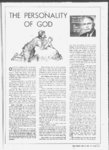| OCR Text |
Show 1 AI h THE OF GOD ;'f , 1 4 1 1 ; of our problems is that serious have grown up in some about God and our own eternal who believe that God is Those destiny. dead or that He is some kind of thing or "influence without body, form, passions or personality place themselves at a serious disadvantage. When we make God a nothing by depriving Him of His body faculties, senses and personality traits, it is then just a short step to believing that He is dead. Sometime ago a prominent minister analyzed the Bible doctrine concerning God, and at the same time he made a surrelivey to discover what the present-da- y gious ministers believe God to be. The minister conducting the survey pointed out that the God of the Bible is a personal God; there can be no question Father that Jesus about that. The prayed to and loved was a personal being. JESUS TAUGHT that God . was His literal earthly father as well as the father of His eternal spirit He also taught that God was the father of the spirits of all men. The God in whose image man was created is a personal God. Jesus claimed that He was in the exa,ct. image of His fathers person, and what could have been more natural and reasonable? The inspired scriptures speak of God in terms of His hands, His feet, His face, His eyes, and His ears. He talked with Moses face to faceeven as one man speaks to'His friend. Many other pfcopfe have seen God, including the Prophet Joseph Smith in our own generation. All have testified that He w'alks and talks, listens and understands. He possesses love, kindness, joy and sorrow. The God of the Bible is a physically embodied "person. He has the greatest intelligence. He has such a glorious personality that man in his natural state could not survive in His One r Jf 5 r- - presence. While Moses was in Gods presence, Gods glory rested upon him. When Moses came back to talk with his people, it was necessary to put a covering over his face so the people could endure his presence. BUT T1IE minister making the survey discovered that many present ministers dont believe in the Bible, and consequently many no longer believe in a personal God. One of those questioned in the survey said that to him God was like a great electronic brain. Another said that the term God is our expression for all of the forces and powers that we dont understand or with which w'e are unfamiliar. Another gave the opinion that God changes as mans opinion differs, and he said that God is atheism to the atheist. Some said they believed in an immaterial God without body, parts or passions; yet scientists tell us that there is no such thing as immaterial matter. Some believed in a God who was unknowable, indiscernible, and undiscoverable, that he is a sort of an essence without substance, shape, or boundaries. Because such a contradic tion does not and could not exist, others merely say that God is dead. The famous atheist, Robert G. Ingersol, once said that he did not disbelieve in God ; what he denied was not God but the concept of God held by some modern-daChristian creeds. Oile minister in the survey described God as an eternal principle. How would you like to be an eternal principle ? Or how would you like to be deprived of your personality or your body ? If a body were not necessary it would never have been created in the first place. 1 k were not necessary for eternity, the resurrection would never have been, instituted. IF A BODY were not necessary for God the Father, then God the Son would never y have been resurrected. A great modern passage of scripture given by God himself says that both God the Father and his Son, Jesus Christ, have bodies of flesh and bones as tangible as mans. (D&C 130:22). Both of them are real persons. Some people are afraid of being accused of credulity when they profess to believe in a personal, anthropomorphic God. But could anything surpass the credulity of one whs believes in a God that no one can ever see or understand or know? The Apostle Paul said, The spirit itself beareth witness w ith pur spirit that we are the children of God. fRom. 8:16). This is no mere figure of speech. Our reason tells us that and "it did not beget the Lord Jesus Christ, either in the spirit or in the flesh. Certainly things do not beget people. One of the greatest ideas in the. world, is that God is not an "It but a "Thou. He is a real person. Only a person can take sides on moral questions as God and man does. Only people have moral tendencies. The only God whom man can adore with awe and joy is personal. No impersonal thing is worshipful. No abstract idea is worshipful. No matter how' great a thing may be, it still lies far beneath the level of the soul. UNLESS GOD is personal the deepest meanings of divine gratitude and worship in human hearts have no place. To ask God to forgive us our sins is utterly irrational if God is not a personal being. Only persons care about what we do. ) If we read the Lord's Prayer we can see the utter futility of addressing such a petition to an impersonal force or principle or thing. The divine motives that lead men to seek Gods blessings, forgiveness!, guidance and cooperation plainly imply his personality. Things do not forgive us or love us. Indeed personality is the most unlimited reality in the universe and is one of the greatest values with which we ever deal. In comparison to a soul, even a solar system is a little thing. The ministry of Jesus, as well as Christianity itself, stands or falls with the personality of God. Inasmuch as we are His children, our own success and happiness also depend' upon that point. God is our gracious, eternal Heavenly Father, who has great satisfaction in our success. Because it is so important to our welfare, He also has great joy w'hen one of His erring children repents. His intimate concern for us is indicated in such thoughts that even the hairs of our heads are numbered unto him. (Matt. 10:30). May God bless our lives that we may be worthy to become like our eternal parent. WEEf ENDING A NIK 29, i A f 197 CHUHCH )3 |













































